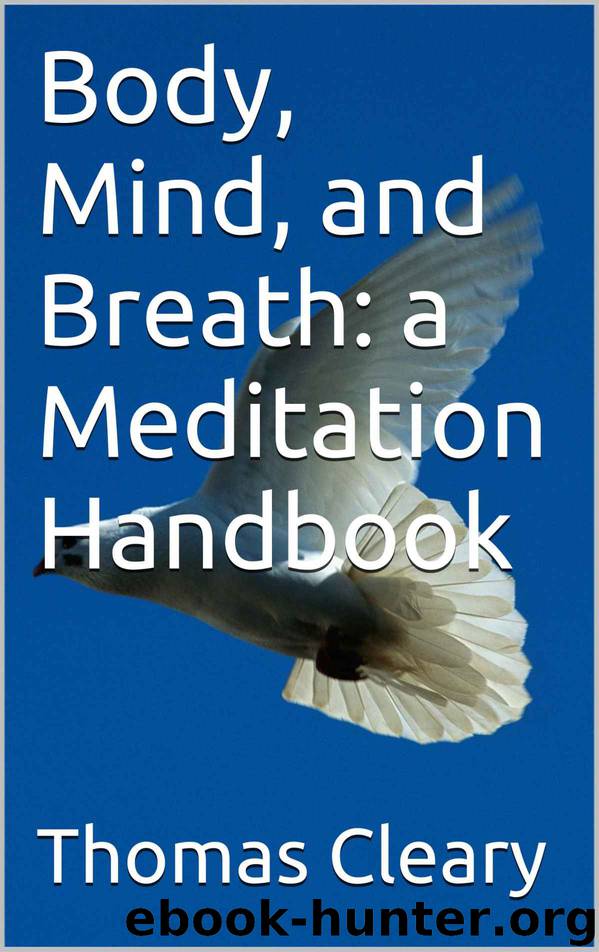Body, Mind, and Breath: a Meditation Handbook by Cleary Thomas

Author:Cleary, Thomas [Cleary, Thomas]
Language: eng
Format: epub
Publisher: UNKNOWN
Published: 2011-09-02T16:00:00+00:00
5. Expedient practices
To practice stopping and seeing you need to be equipped with expedient methods. There are five of these elements.
One is intent: intent to detach from all false ideas and wrong ideas in the world; intent to acquire all the methods of knowledge of all meditations. This is also called will. It is also called vowing. It is also called devotion and delight, because the person wills and vows devotion delighting in all profound principles. So it is called intent. Buddha said, “Intent is the root of all good things.”
Second is diligence: holding firmly to the precepts, removing the five covers, focusing effort unremittingly in the first and last watches of the night, like one who drills for fire never stops before producing heat. This is called diligence in good ways.
Third is mindfulness: mindfulness that the world is deceptive and despicable; mindfulness that meditation concentration is important and valuable. If you attain meditation concentration, you can fully activate all sorts of untainted knowledge, all spiritual capacities, and powers of the path, attain the equivalent of true enlightenment and save many people—this is considered valuable. So this is called mindfulness.
Fourth is intelligence to assess gain and loss: the triviality and worth of the pleasures of the world and the pleasure of meditation concentration and insight. Why? The pleasures of the world involve more pain that pleasure; they are deceptive and insubstantial. This is loss; this is triviality. The pleasure of meditation concentration and insight is uncontaminated, uncontrived, serene freedom, eternally liberated from birth and death, parting forever from pain. This is gain; this is worth. Because it makes such distinctions, it is called intelligence.
Fifth is singleminded clarity, clearly seeing the trouble and negativity of the world, clearly seeing worthiness and value in the virtues of concentration and insight. Then you should singlemindedly resolve to cultivate the practice of stopping and seeing, with a mind firm as diamond, invulnerable to the celestial devil [the delinquent tendency of cognitive consciousness] and outsiders, never to turn back or change even if nothing is gained. This is called singlemindedness. For an analogy, it is like someone traveling who first needs to know the conditions of the road, where it’s passage and where it’s blocked; and only then can walk on with a settled mind. So to express intelligence and singlemindness, when scripture says, “No meditating without knowledge, no knowledge without meditation,” the meaning lies in this.
Download
This site does not store any files on its server. We only index and link to content provided by other sites. Please contact the content providers to delete copyright contents if any and email us, we'll remove relevant links or contents immediately.
| Acupuncture & Acupressure | Aromatherapy |
| Ayurveda | Chelation |
| Chinese Medicine | Energy Healing |
| Healing | Herbal Remedies |
| Holistic | Homeopathy |
| Hypnotherapy | Massage |
| Meditation | Naturopathy |
| Reference |
Inner Engineering: A Yogi's Guide to Joy by Sadhguru(6793)
The Power of Now: A Guide to Spiritual Enlightenment by Eckhart Tolle(5781)
Fear by Osho(4735)
Ikigai by Héctor García & Francesc Miralles(4274)
The Art of Happiness by The Dalai Lama(4130)
The Ultimate Bodybuilding Cookbook by Kendall Lou Schmidt(3945)
Yoga Therapy by Mark Stephens(3745)
The Little Book of Hygge by Meik Wiking(3693)
The Healing Self by Deepak Chopra(3578)
Why Buddhism is True by Robert Wright(3451)
The Hatha Yoga Pradipika (Translated) by Svatmarama(3341)
Being Aware of Being Aware by Rupert Spira(3276)
Shift into Freedom by Loch Kelly(3196)
Wild Words from Wild Women by Stephens Autumn(3153)
Work Clean by Dan Charnas(3122)
Happiness by Matthieu Ricard(3047)
More Language of Letting Go: 366 New Daily Meditations by Melody Beattie(3027)
Yoga Body & Mind Handbook by Jasmine Tarkeshi(2879)
Why I Am Not a Feminist by Jessa Crispin(2760)
